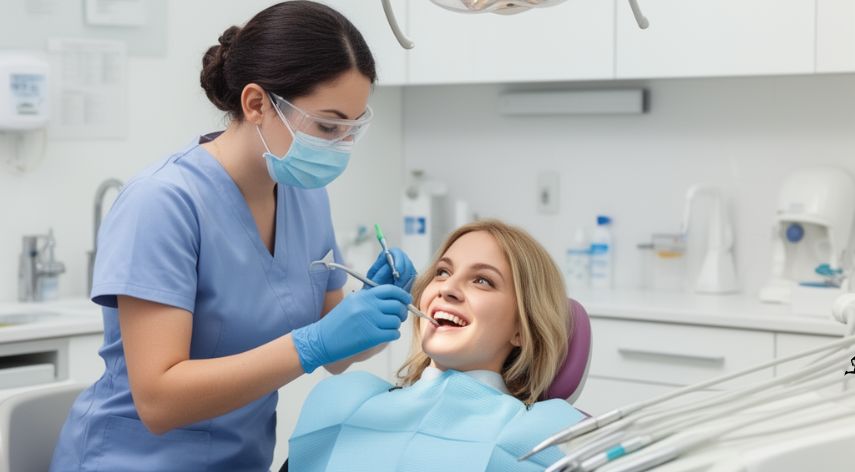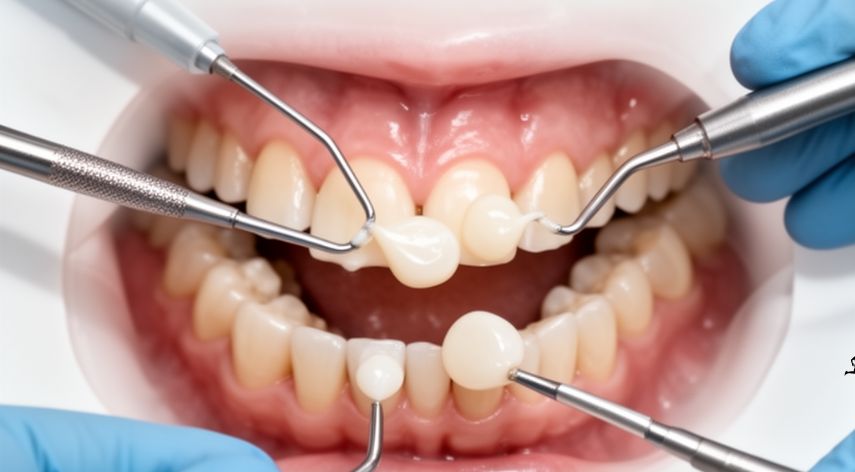Teeth Whitening: What Happens During Treatment and How Long Does It Take

Teeth whitening have become the most common cosmetic dental treatment. Whether we say it or not, manyof us wish we had a set of pearly white teeth to show off. While we may not have our wishes of having the perfect white teeth granted, we still have the chance to make it happen through teeth whitening.
To get started, you can book an online appointment with us at Teeth Whitening London. Perfect white teeth are the ideal aesthetic, and achieving them is not so difficult.
What is teeth whitening?
Teeth whitening is the process of brightening and whitening the teeth by bleaching them. It involves the use of whitening agents to lighten the teeth in several shades. Know that teeth whitening will not make the teeth completely white; instead, it removes the stains and brightens the colour.
To achieve excellent results, it is recommended that you go for professional teeth whitening. This is because the results are evident in a short period. With professional teeth whitening, supervision is done by a dentist – itis also quite popular among people who are disappointed with over the counter products.
What happens during teeth whitening?
Before you have your teeth whitened, your dentist will have to ensure that your teeth and gums are healthy; to ensure this, you would have to visit your dentist multiple times for a few months. The health of the teeth and gums is checked because strong chemicals are used for the professional teeth bleaching process. Having one or more of the conditions listed below will prevent you from getting your teeth whitened.
- Worn out enamel
- Exposed roots of teeth
- Cavities
- Gum disease or gingivitis
Before the teeth whitening, your dentist will make a mouth guard out of an impression of your teeth and show you how to use it with a bleaching gel. After that, you would be required to apply the gel to the mouthguard at home for a specific period, usually over 2 – 4 weeks. Some whitening products can be used for up to 8 hours, which shortens the treatment time to only one week.
Laser whitening is another type of teeth whitening, and it is also known as power whitening. In this method, a bleaching product is used on your teeth to trigger the whitening, and a light or laser is shone on them. With laser whitening, your teeth can be whitened in one hour.
Who can do a teeth whitening?
This type of cosmetic dentistry should only be done on the recommendation of a dentist or a regulated dental hygienist, dental professional or dental therapist.
Without the presence or supervision of a dental professional, it is illegal to get your teeth whitened, even though teeth whitening treatment is offered in some beauty salons. This is purely for the reason that it can jeopardise your oral health.
Side effects and considerations
While teeth whitening is considered safe, you may experience the following side effects after the procedure:
- Irritated gums: Gingival irritation is a possibility after teeth whitening. This happens when the gums get irritated as a result of contact with the whitening substance. There are medications for this, and the irritation should reduce after the medications have been taken.
- Sensitive teeth: After teeth whitening, your teeth can become sensitive and more responsive. This usually happens on the first or second procedure and should disappear with time. Your dentist can use products that contain potassium nitrate and sodium fluoride to treat the sensitivity.
You should know that teeth whitening is not a permanent solution. You will have to embark on them regularly for intrinsic and extrinsic discolouration. Also, note that teeth whitening is only for natural teeth as they do not work on braces, dentures or bridges.
Does the whitening system work on dentures or veneers?
Existing fillings such as dentures, crowns, and veneers do not lighten. Teeth whitening only works on the natural teeth and is made to bring out the enamel’s natural whiteness. If you have your teeth whitened afterdental work, the dental work will have to be replaced to fit the new colour of the tooth hue. For some clients, the whitening gel is only used on their natural teeth.
How many shades lighter will my teeth be after teeth whitening?
The rate at which your teeth brighten up depends on the patient’s preferences and can vary from person to person. Although the shades may differ, it is usually around 6 – 12 shades lighter after the treatment. The overall outcome will also depend on how stained or discoloured your teeth are. Teeth that are uniformly stained, yellow or brown, are the best to whiten. There are other additional whitening treatments for those with heavily stained teeth.
Is the treatment painful?
You may experience irritation during and after treatment, as well as minor gum discomfort. However, they should go away within the next couple of days after treatment.
Can I make my treatment last long?
You can do a few things to keep your teeth whiter for long after the teeth whitening process. You can start by staying away from food and beverages like coffee, berries, soda and tomato-based food. These are foods and drinks that stain the teeth. If you consume any of them, clean or rinse your mouth afterwards.
What is the cost of teeth whitening?
The cost of teeth whitening varies from clinic to clinic. However, the cost is between £1,500 -£5,000.
You should be careful of the clinic you choose to get your teeth whitening treatment. Make your selection carefully, and do not forget to ask for recommendation from family and friends. If you are staying in London and do not know where to get your teeth whitened, you can book your teeth whitening appointment online at Teethwhitening.london.
Recommended For You
In the heart of the City of London, maintaining excellent oral health is essential for busy professionals and residents alike.
If you’re searching for “composite bonding near me” in London, it’s important to know what truly sets a clinic apart.
Cancer affecting the urinary tract and male reproductive organs requires specialized care. This is where uro-oncology plays a crucial role.
Browse by Category
- Travel
- Technology & Gadgets
- Sports & Games
- Software
- Shopping
- Reviews
- Real Estate
- Numerology
- News
- Make Money
- Lifestyle
- Law
- Home Improvement
- Health
- Gardening
- Games
- Finance
- Entertainment
- Education
- Digital Marketing
- Diet and Fitness
- Dating
- Construction
- Celebrity
- Career and Jobs
- Business
- blog
- Angel Number



